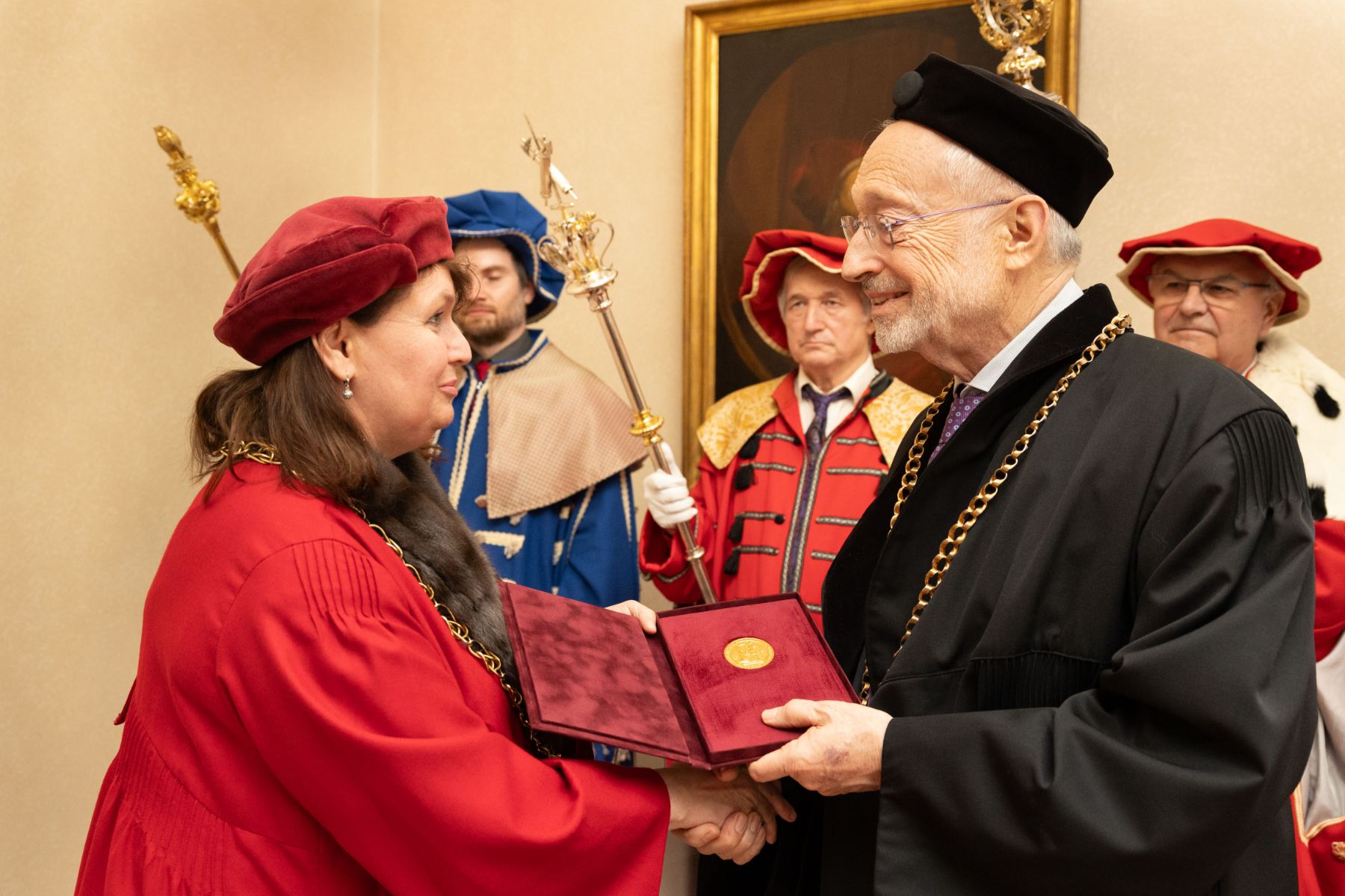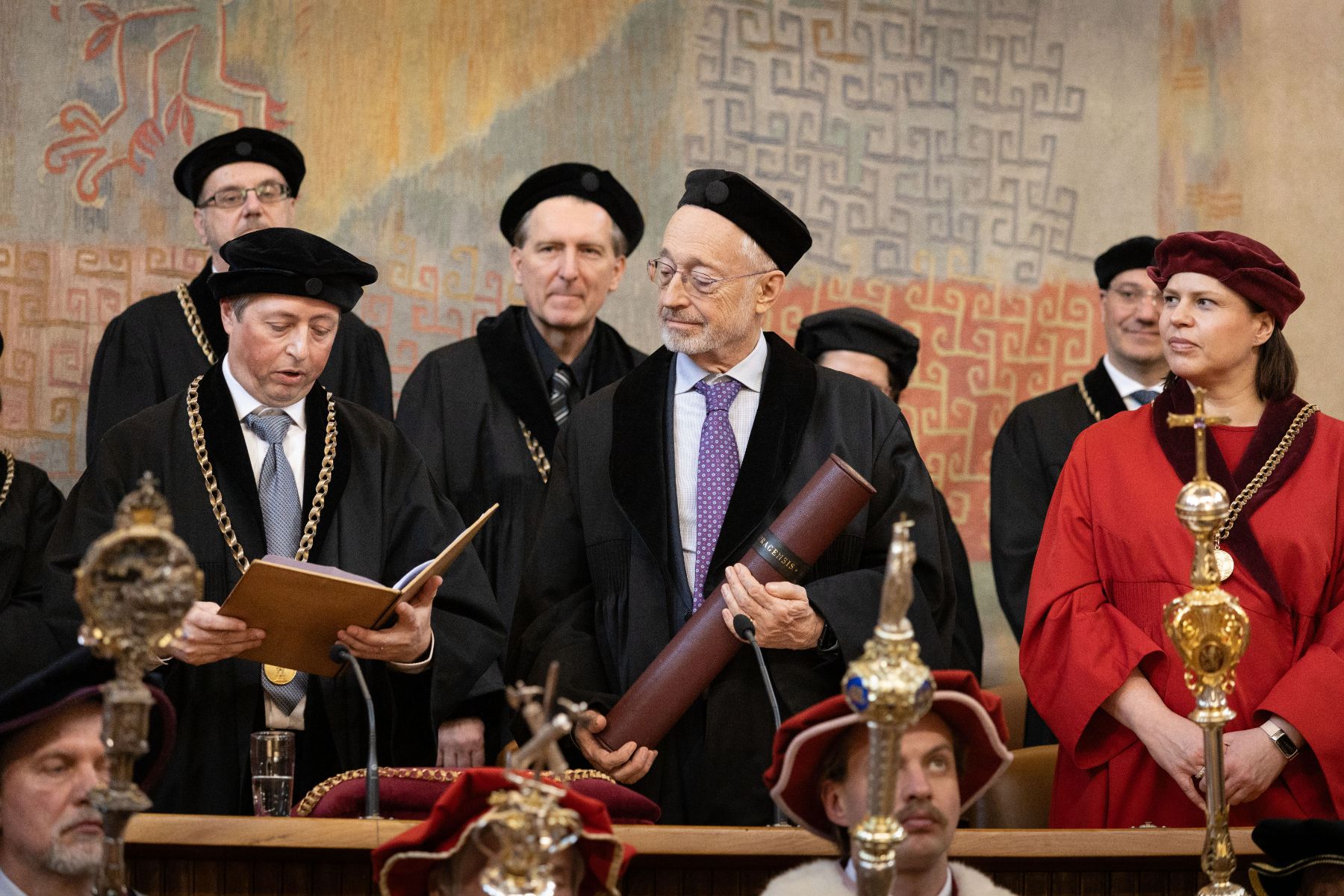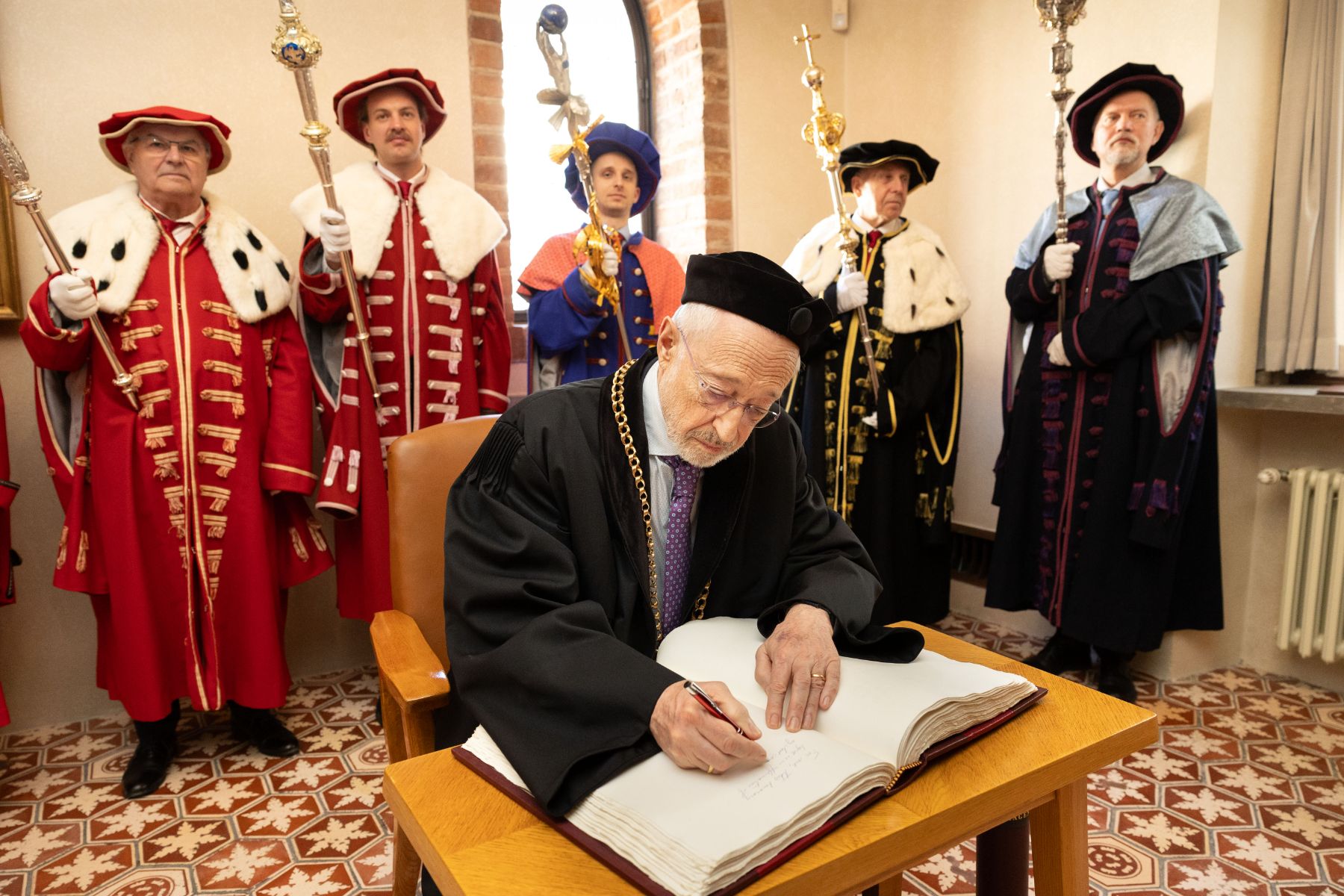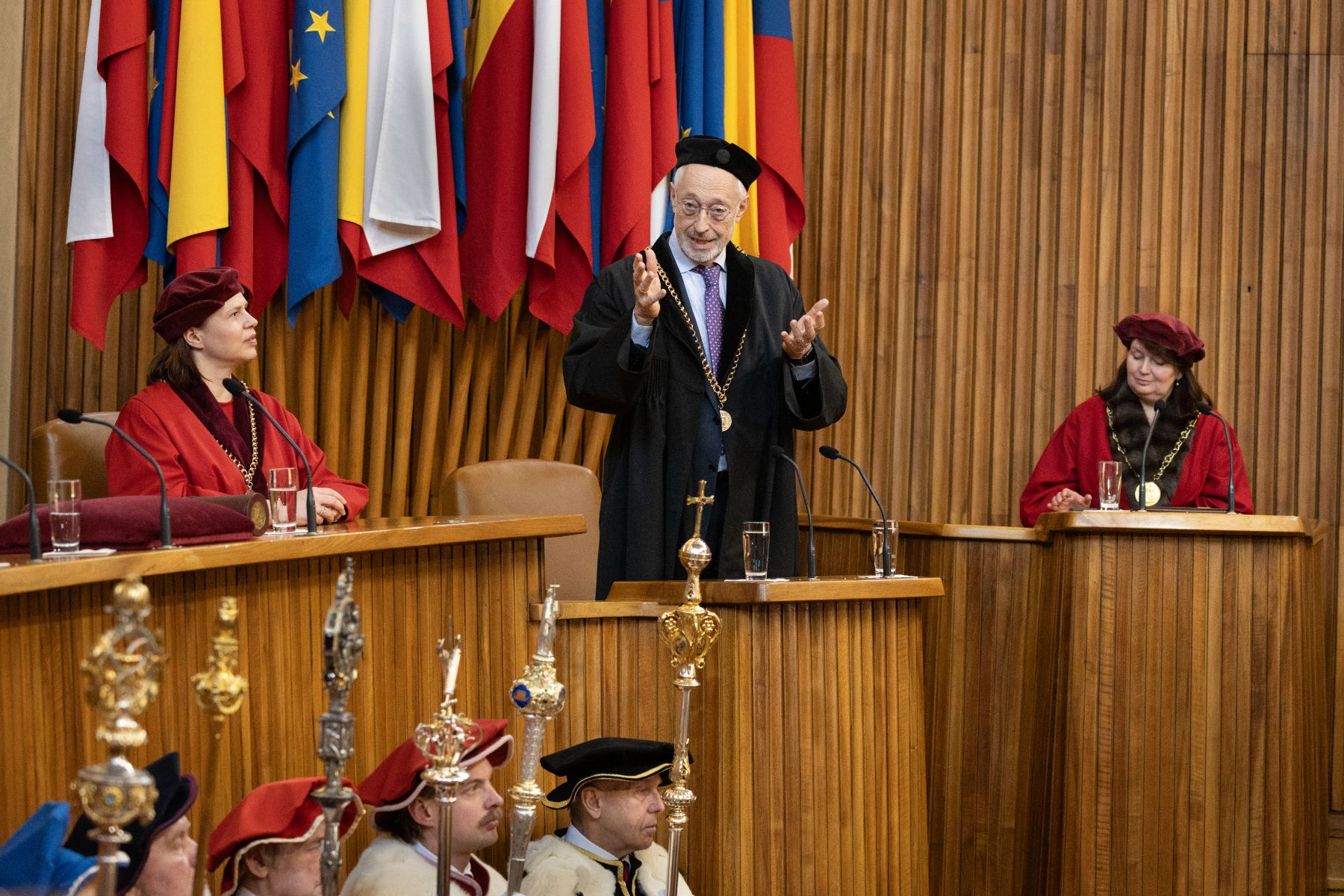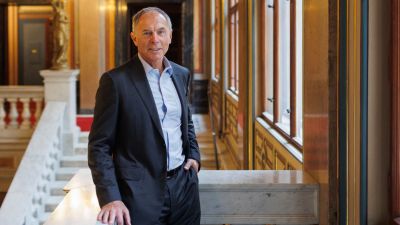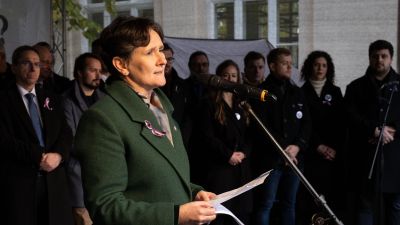Economist Paul Robert Milgrom's work has significantly influenced many areas of modern economics and related sciences. In particular, he transformed the world of auctions, for which he was awarded the Nobel Prize in Economics. He also works closely Czech colleagues, especially within CERGE-EI. He has now received the honorary title of doctor honoris causa from Charles University.
"After college, when I worked for five years as an insurance consultant (actuary) at Metropolitan Insurance Company in San Francisco and then at Nelson and Warren, a consulting firm in Columbus, Ohio, I first discovered my passion for doing theoretical research on practical problems," recalls Professor Paul Robert Milgrom. "For improving auction theory and inventing new auction formats," he was awarded together with Robert B. Wilson, his former teacher and later colleague, the Nobel Prize in Economics in 2020.
Professor Milgrom, who is currently at Stanford University, is one of the founders of modern economics who helped apply game theory and information economics to a wide range of economic problems, including pricing policy, auctions, financial markets and industrial organisation. He is also the co-founder of several companies, such as Auctionomics, which provides software and services for commercial auctions and exchanges.
You can learn more about game theory in the Czech Academy of Sciences' popularisation video Nezkreslená Věda.
"I always had some awareness of business problems, but as it happens with budding scientists, my research was purely theoretical at first. I read the existing literature looking for gaps in knowledge, which I then tried to fill," Milgrom recalls. That changed in 1993, when the United States decided to hold an auction of radio spectrum. "No one had any idea how to design such an auction, so they referred to the academic literature, and I was the main contributor on the subject, so they started quoting me and then started calling me," says Milgrom, who found the transition from theoretical to applied research challenging. "It was really a very complex environment that I didn't really know how to deal with. Eventually they wanted me to tell them what I thought of the government's current proposal – I didn't know the ideal solution, but I advised them on how to do it better. And in doing so, I realised that in the applied world, it's not necessary to find the most perfect solution and prove the most general theorem. All you need to do is to improve the status quo. And so I started my career in that way, and it changed my whole life," the award-winning economist told Forum magazine.
"In the business world, they say don't let the perfect be the enemy of the good. And academics don't like to hear that. When they write academic papers, they want to have a small area in which they are perfect. But in practice you have a much bigger area that you need to be good at – you want to cover everything that's important and make sure you haven't forgotten anything and have done everything to the best of your ability. The theory may not be 100% valid in that case, but it works in the situation," he says, describing his vast experience.
Professor Milgrom's research has had a major impact on many areas of modern economics and related sciences, including game theory, comparative statics, market design, organisational and information economics, industrial organization, law, institutions and economic history, finance and macroeconomics. How does he see the future development of his field? For example, how will artificial intelligence transform the world of auctions? "Artificial intelligence is impacting auctions in many ways, and has been for many years. It's not just the big language models that are the main trend now. Companies have been using machine learning for almost a decade to estimate optimal bidding strategies or to simulate what would happen if they changed the rules of an auction. AI will continue to grow in importance," says Milgom, continuing. "It will likely transform entire economies. But we still don't know much about big language models. I'm an optimist and sceptical at the same time. On the one hand, there are some very hard problems that we may soon solve thanks to AI. AI is also likely to help with the dissemination and availability of information about, for example, auction theories. But for certain aspects, machines are not enough. In fact, personal preferences play a big role in auctions - how much value an item has for you, what your preferences are, what your skills and values are, and even your plans for the weekend. All of this greatly influences your decision-making and market behaviour. And neither I nor a machine can guess that, so we will continue to need market design," Milgrom believes.
Economics helps solve societal problems
"I believe that people don't measure my success just by the amount of awards. Practical applications are much more important to me," says Professor Milgrom, who also uses his theories and tools to solve a variety of practical problems. His latest efforts are aimed at creating new markets for water rights, with a particular focus on surface water in California. "In the western United States, where I live, water is becoming a critical resource and is being really mismanaged. Yet there are solutions to use water efficiently and equitably, we just need to convince a lot of actors and change our behavior and the way we manage water," says the economist, who has also recently been focusing more on teaching and training students.
What advice would he give to today's young people to prepare for the future? "It's hard to predict, but I advise all my students to learn to use artificial intelligence. Obviously, it will have a big impact," Milgrom believes. He also sees data analysis as important: "We have more and more information and data about the world around us. In economics, for example, empirical analysis has advanced significantly. We no longer have to rely solely on correlations, but can ask questions about what would happen if I changed this or that parameter."
His third recommendation is that we all need to prepare ourselves for lifelong learning. "Today's world is changing rapidly. And the things and skills that will be important tomorrow we may not yet be able to imagine. We should prepare ourselves to learn all the time. We will need to keep a broad perspective and keep our eyes open to the new methods that are being developed, to the things that are happening in the world," Professor Milgrom says, hoping at the same time that students will retain their empathy and desire to improve the world around them.
They didn't tell us that half of us would win the Nobel Prize
"Throughout my career, I have always been very fortunate in the environment in which I have worked. My early research career was associated with the Kellogg School of Management at Northwestern University in Chicago, where they told us that about half of us would get a professorship. What they didn't tell us was that half of us would also win the Nobel Prize," says Paul Robert Milgrom, who also worked there with three other future Nobel Prize winners - Roger Myerson, Robert B. Wilson and Bengt Holmstrom. "It was a very stimulating and at the same time friendly environment, in fact we were kind of in competition with each other, and that drove us on, helping and motivating each other," he recalls of the collaborations, as well as the intellectual debates and controversies that shaped economics for decades to come.
"For me the Nobel Prize was not a goal, I didn't think about it, I ignored it. Even that night, like everyone else, I turned off my phone and went to sleep... Since then, of course, it's been hard to ignore it because winning the Nobel Prize affects your life - it affects the way people communicate with me, how much they're willing to pay me to work on commissions, it affects a lot of things really. But I don't think it's possible to 'try' for a Nobel Prize. I think you're just doing the best job you can. And if this start is right, it will happen," the laureate says.
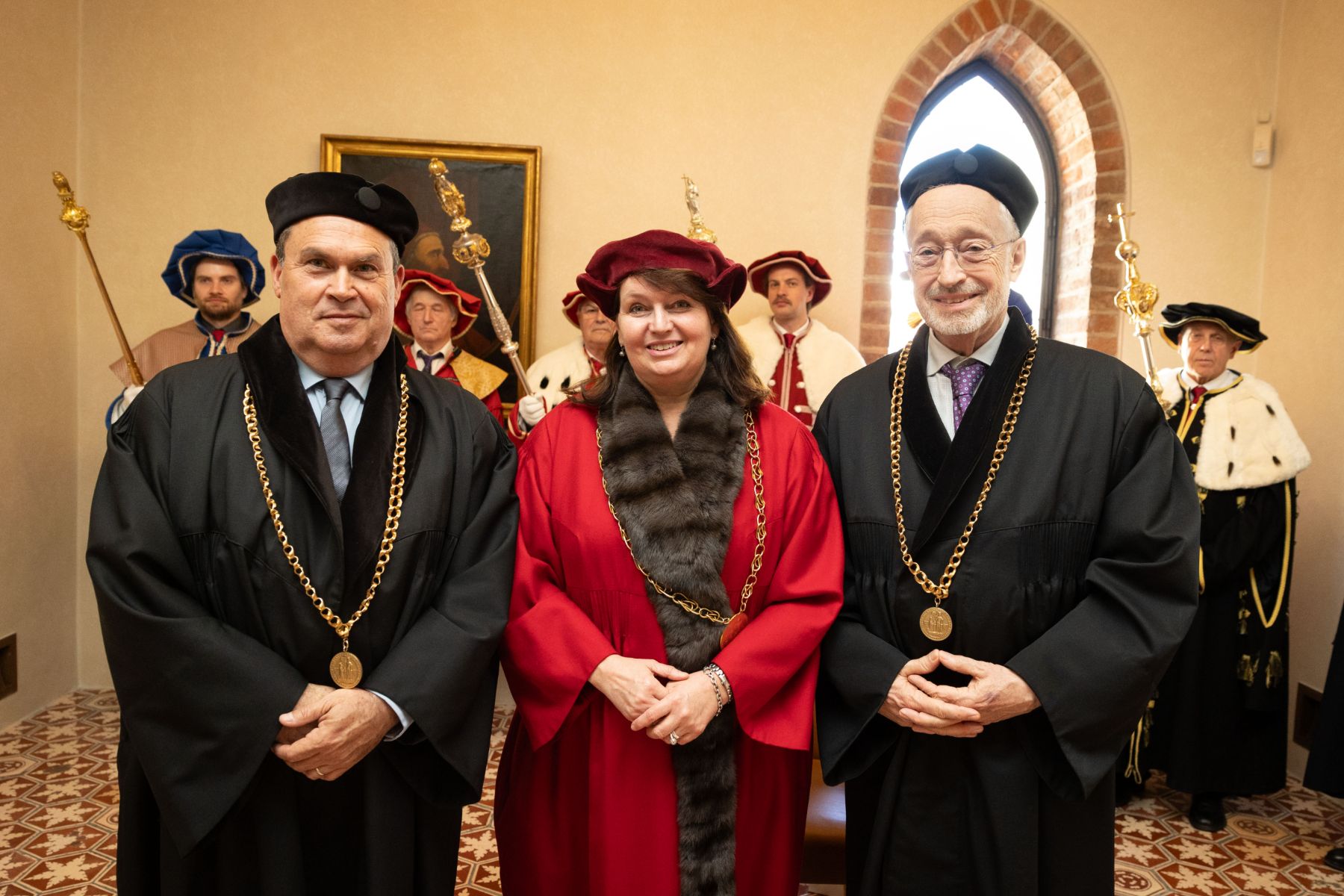
Professor Milgrom received an honorary doctorate together with Professor Lipschits.
To Prague for science and family
If Professor Milgrom was lucky with the environment, CERGE-EI, a joint department of Charles University and the Economics Institute of the Czech Academy of Sciences, was lucky with Professor Milgrom. In fact, he was an active member of CERGE-EI's International Executive and Supervisory Committee from 2015-2020. During his regular visits to Prague, Professor Milgrom always engaged in consultations and discussions with students and academics, thus contributing significantly to the development of their research to world-class standards. A concrete example of this is Filip Matějka and Jakub Steiner, key CERGE-EI researchers who have managed to publish articles in the world's most prestigious scientific journals in the field of economics, as well as to obtain the first ERC grants in the Czech Republic in the field of economics and social sciences in general. "I have always loved coming to Prague - I have part of my family here. Unfortunately, my brother passed away last year, but I still love coming here to visit my daughter-in-law and niece Mia," says the Nobel laureate, who received the honorary degree of doctor honoris causa from Charles University on 19 March.
| Prof. Paul Robert Milgrom |
| Professor Milgrom, who is currently at Stanford University, is one of the founders of modern economics who helped apply game theory and information economics to a wide range of economic problems, including pricing policy, auctions, financial markets, and industrial organization. He was born in 1948 in Detroit, Michigan. He graduated from the University of Michigan in 1970 with a degree in mathematics. He worked for several years as an actuary. In 1975, he began graduate studies at Stanford University, where he received a master's degree in statistics in 1978 and a doctorate in business in 1979. He began his academic career at the Kellogg School of Management at Northwestern University in Chicago, where he was first an assistant professor and then an associate professor from 1979 to 1983. From 1982 to 1987, Milgrom was a professor of economics and management at Yale University. In 1987, he returned to his alma mater, Stanford University, as a professor of economics. Professor Milgrom is the recipient of many distinguished awards. The most famous is the Nobel Prize in Economic Sciences, which he won with Robert B. Professor Milgrom has also made a significant contribution to the development of the Czech academic environment. From 2015-2020 he was a member of the international Executive and Supervisory Board of CERGE-EI. |


